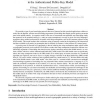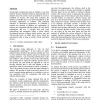65 search results - page 10 / 13 » Fuzzy Argumentation for Trust |
IJCNN
2007
IEEE
14 years 2 months ago
2007
IEEE
— Serious efforts to develop computerized systems for natural language understanding and machine translation have taken place for more than half a century. Some successful system...
CORR
2006
Springer
13 years 7 months ago
2006
Springer
We consider a type of zero-knowledge protocols that are of interest for their practical applications within networks like the Internet: efficient zero-knowledge arguments of knowl...
DEPCOS
2008
IEEE
14 years 2 months ago
2008
IEEE
Achieving and assessing conformity with standards and compliance with various sets of requirements generates significant costs for contemporary economies. Great deal of this is sp...
SCS
2004
13 years 9 months ago
2004
In this paper I examine the issue of whether we can trust software systems and put forward an argument that in an absolute sense the answer must necessarily be no for a multitude ...
ISSA
2004
13 years 9 months ago
2004
Computer security, and intrusion detection in particular, has become increasingly important in today's business environment, to help ensure safe and trusted commerce between ...


